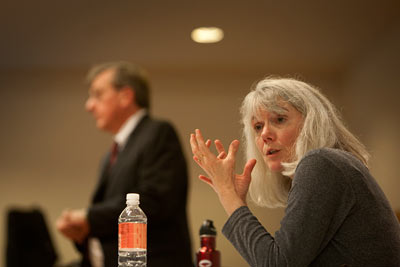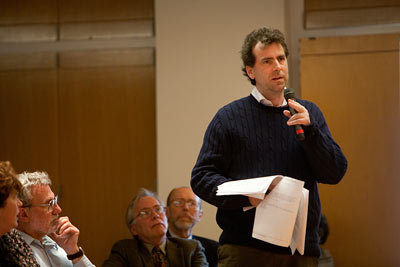Faculty members demand control over libraries' future
By Susan Kelley


In a spirited discussion at a Nov. 24 public forum, faculty overwhelmingly said they wanted more oversight of the library system. Most who spoke vigorously disagreed with Cornell University Library's recommendations to close some of its 18 libraries, to build and share collections with other universities and to sell off duplicate copies of books.
"These should be matters for faculty governance. The faculty shouldn't just be consulted in these matters. It should have determinative force," said Eric Cheyfitz, the E.I. White Professor of American Studies and Humane Letters, to a round of applause. Faculty members sit on the Cornell Library's (CUL) faculty advisory board and some were also are on the task force.
About 225 people attended the discussion in G10 Biotechnology Building, moderated by Provost Kent Fuchs. It was the second of six public discussions about strategic plan task force reports that affect the university as a whole. The provost asked the library task force for recommendations about priorities and opportunities to save costs and enhance revenue.
University Librarian Anne Kenney agreed with many of the criticisms. However, she pointed out, the CUL had been asked to consider how to shave an additional 10 percent from its $44 million budget. While pleading for the collections budget to be exempt from further cuts, Kenney noted that CUL can remain one of North America's top 10 research libraries even with significant cuts. Or it can keep all 18 of its libraries open. But it can't do both.
"Maintaining a significant number of physical facilities in an increasingly digital world bleeds our ability to provide critical scholarly resources," Kenney said.
But for humanists, libraries are essential to their research, several faculty members said. "If we don't have books, we don't have our laboratory," said Charles Brittain, chair and professor of classics.
Several audience members also expressed concern about the recommendation to partner with Columbia University to share materials. Services diminish when any organization consolidates, said Sarosh Kuruvilla, professor of industrial relations, Asian studies and public affairs. For example, after the library consolidated acquisition services, it took 36 days for him to receive a book he had requested. "You're not telling us what is the price that students and faculty will have to pay through this massive reorganization you're talking about," he said. Kenney assured him that CUL is committed to providing scholars with the materials they need and that it shouldn't have taken so long to get that book.
A shift toward centralized acquisition would hurt specialized collections without trained librarians to acquire the proper books, said a graduate student in Latin American studies. "How is this [Latin American] collection going to keep growing if we have no representative with specialized knowledge in a very large field?"
Even the physical presence of books themselves on campus has research value, one student said. "So many extraordinary discoveries are made unexpectedly. The dusty book that hasn't been opened in decades next to the one we were actually looking for may be the one that ends up being crucial," the student said. Kenney reiterated her pledge to maintain the same number of books within Olin, Kroch, and Uris libraries for the tenure of her term as university librarian, but noted that each year the library acquires more than 100,000 books, requiring the equivalent of 2 miles of additional shelving to house them.
In many academic disciplines, a physical library is critical to research and teaching, Fuchs agreed. However, he said he is not convinced that physical spaces are critical in all areas; he will pursue consolidation with deans in various schools and colleges, he said. "We may be able to come up with a stronger library through consolidation."
Kenney said that, in general, the Library recommendations included: organizing the library system around cross-college subject clusters; protecting the collections budget from further cuts; continuing to join forces with Columbia University and other institutions; providing the best, most affordable academic technology services by integrating the efforts of the library, CIT and units; and consolidating the library budget under the management of the university librarian.
Brown-bag lunches:
• Dec. 3: Life Sciences, noon-1 p.m., Ramin Parlor Room, Sage Hall (off the atrium), with Kent Fuchs, provost, Nelson Hairston, chair of the Department of Ecology and Evolutionary Biology, and Robert Buhrman, senior vice provost for research;
• Dec. 4: Social Sciences, noon-1 p.m., Weill Hall Atrium, with David Harris, deputy provost and vice provost for social sciences;
• Dec. 9: Libraries, noon-1 p.m., Ramin Parlor Room, Sage Hall (off the atrium), with David Harris, deputy provost and vice provost for social sciences, Anne Kenney, university librarian, and John Siliciano, senior vice provost for academic affairs.
Formal public discussions, facilitated by Provost Kent Fuchs:
• Dec. 1: Social Sciences, 4:30-5:30 p.m., Lewis Auditorium, G76 Goldwin Smith Hall;
• Dec. 2: Management Sciences, 12:15-1:15 p.m., G10 Biotechnology Building;
• Dec. 7: Life Sciences, 4:30-5:30 p.m., Lewis Auditorium, G76 Goldwin Smith Hall; and
• January: Budget Model, date, time and location to be determined.
For more information, see the strategic planning Web site.
Media Contact
Get Cornell news delivered right to your inbox.
Subscribe